Kingdom of Women
Kearns skillfully walks the tightrope between feminist polemic and literary experiment.
Kingdom of Women turns the tables on patriarchy, creating an alternate world where bands of vigilante women strike back at transgressors. Rosalie Morales Kearns’s thought-provoking, dynamic novel explores violence against women alongside themes of mysticism, revenge, and the unusual alliances that shape history.
Nothing is hyperbolic about the plot’s inciting crimes. They include massacre at the hands of a lone wolf, domestic abuse, rape in Serbian camps, and similar events across the globe—each chilling in their verisimilitude, each numbing in their familiarity. The novel itself, however, is a wild portrait in extremes, allowing off-center characters to fuel a parable for modern times.
The plot follows eccentric Averil Parnell, the first woman Catholic priest; Catherine Beck, an ex-marine-turned-assassin; and John Honig, a rapist whose tenure as a student of architecture lands him in Averil’s path. From the visionary to the warrior-woman to the arrogant sociopath, each heightened persona is laced with insight.
Catherine resounds as a clear-eyed, calculating avenger. Her response to John stands in sharp contrast to that of Averil, a woman caught between the turmoils of her flesh and spirit. John is memorable as an unexpected source of dark humor, despite his misogyny. All three reveal facets of single-minded obsession.
When war breaks out between the US government and women who are labeled a terrorist threat, Averil and Catherine set out on a decades-long course that destabilizes the country. Their flight to Erda, a republic of women set in North Dakota (which seceded before the book’s start), marks a significant shift, moving the story out of the intimate spaces of Averil’s garden and church into a wider, militarized landscape. Late chapters spiral into myth-making, allowing time and distance to shape how Averil and Catherine are remembered.
Interweaving scenes complicate the characters’ different responses to a fraying society. In the wake of centuries of abuse, the idea of women turning toward Hebrew Bible justice becomes intriguing philosophically. What the horrifyingly named Defenders of the American Way view as a call to arms by a fringe element turns out to be a movement with deep taproots.
Kearns’s novel skillfully walks the tightrope between feminist polemic and literary experiment.
Reviewed by
Karen Rigby
Disclosure: This article is not an endorsement, but a review. The publisher of this book provided free copies of the book to have their book reviewed by a professional reviewer. No fee was paid by the publisher for this review. Foreword Reviews only recommends books that we love. Foreword Magazine, Inc. is disclosing this in accordance with the Federal Trade Commission’s 16 CFR, Part 255.

